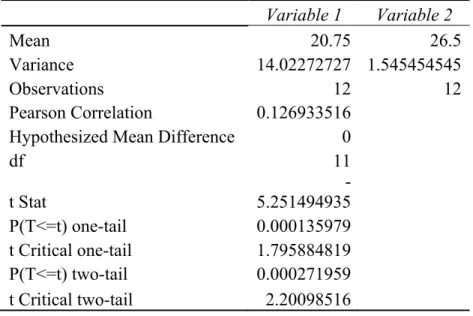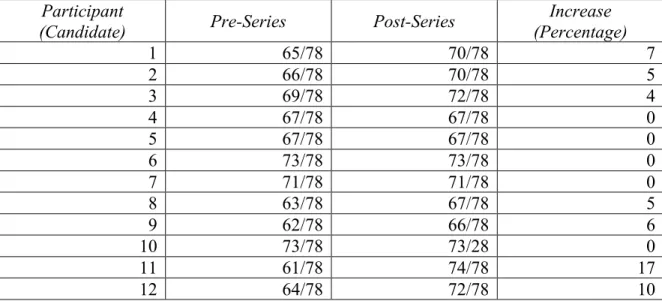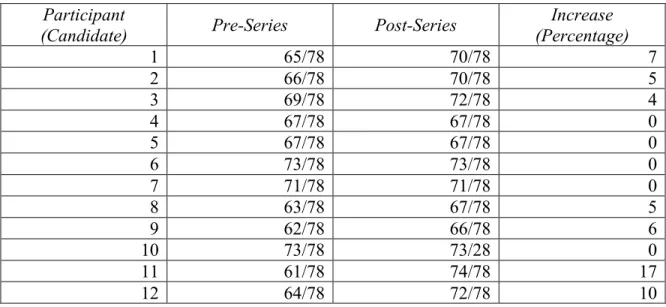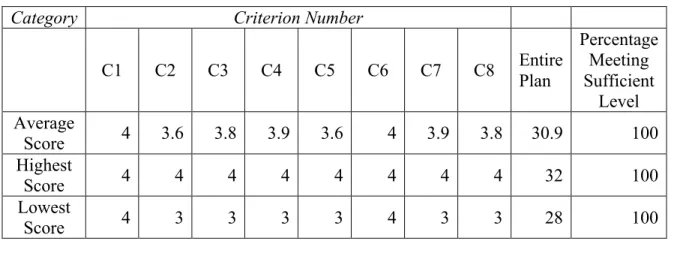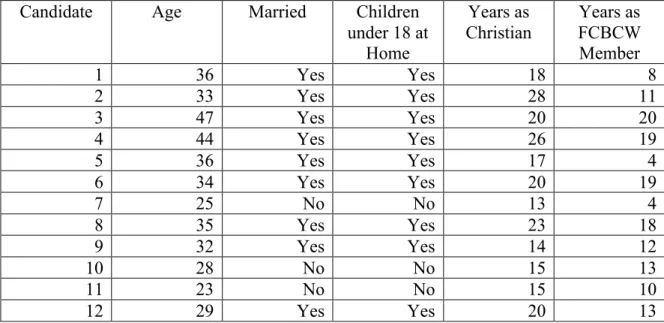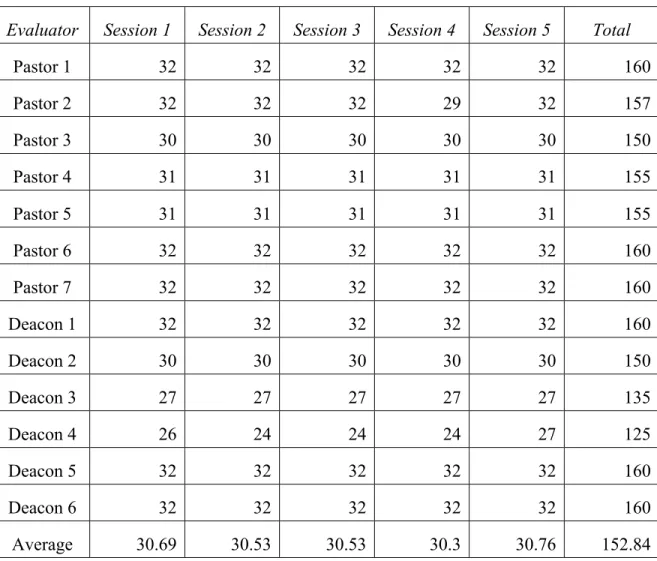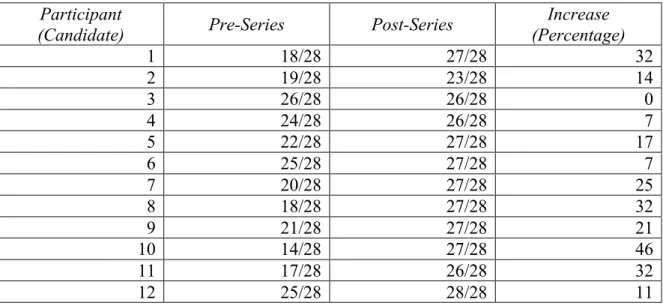With a great sense of awe, I thank God for the opportunity to study at the Southern Baptist Theological Seminary - an institution with an unwavering commitment to proclaim the gospel and glory of Christ. In addition, I am grateful to the professors and support staff in the Applied Theology and Professional Doctoral offices, who have invested in my learning over the past three years; in particular, Coleman Ford helped me sharpen and shape the scope of my initial proposal.
INTRODUCTION
The third objective was to increase the knowledge of the deacon candidates by using the developed curriculum. These analyzed surveys provided a clearer picture of the current understanding of the deacon candidates.
Presents the Prototypical Model for Deacons
The requirements and responsibilities of the seven exemplify the qualifications and role of a deacon. According to their title, deacons must be exemplary spiritual leaders in the service-oriented services of the church. 72.
Clarifying the Role of Deacons within Congregationalism Congregationalism
The New Testament prescribed a pattern of governance where the congregation had ultimate earthly authority over the affairs of the local church. Similarly, the congregation had the responsibility to bring the repentant believer back into the fellowship of the church (2 Cor 2:6). Although the congregation serves as the governing body of the church, the congregational rule does not negate the leadership or supervisory role of pastors.
Pastors lead the members of the congregation to make major decisions regarding the local church. Typically, the priests are seen as the paid professionals, while the deacons are seen as the elected representatives who represent the voice of the laity. In this scenario, it is not entirely clear who actually occupies the office of elder.
At one end of the spectrum, deacons continued to focus on helping with the Lord's Supper, caring for the poor, and supporting the pastor; while on the other hand, deacons began to evolve into a governing board or business manager of the church.36 A dichotomy was being established between the spiritual ministry of pastors and the material management (church business) of deacons. Burroughs, Honoring the Deacon (Nashville: Foshee Southern Baptist Convention Sunday School Board, Ministry of the Deacon, 35.
Clarifying the Role of Deacons at FCBCW
With the biblical clarity that the pastors represent the plural eldership of the church, one way to maintain the clear distinction between elders and deacons - as already said - is to include female deacons. For now, the more immediate issue relates to the process of transitioning the role of the six current deacons, who have held their positions for decades. If they are left out of the decision-making process, the existing deacons may feel as if they have been demoted.
Deacons are by function the spiritual leaders of the church.92 Pastors who want to reorient deacons to service-oriented leadership must constantly emphasize the important, distinct and indispensable role that God has ordained for deacons. Rather than leading the church by preaching, teaching, or overseeing the entire church, deacons lead by organizing the ministry of focused ministries of the church. The seven-week preparatory period included the evaluation of each candidate, the development of the curriculum and the approval of the curriculum by the expert committee.
The first week of the project officially began as twelve candidates agreed to be considered for deacon candidacy. With the reading list determined and the lesson plans written, I distributed a draft of the training curriculum for the pastors and deacons to review and approve.
Week 8)
After giving an overview of the problem and solution in Acts 6:1-6, I asked the candidates the following question: how does the selection of the seven Hellenists apply specifically to the tri-language, tri-congregational context of the FCBCW. Several candidates noted that in Acts 6, a team of culture-sensitive and language-specific ministers maintained unity between the Jewish and Hellenistic church members. Similarly, every congregation in FCBCW needs pastors and deacons who can speak their language and understand the nuances of their respective culture.
To conclude the teaching from Acts 6, I made the following four conclusions regarding the biblical basis for deacons. First, deacons are leading servants who love and serve the church, allowing pastors to focus on the ministry of the Word and prayer. When I went into direct application to FCBCW, I listed the following examples of diaconal ministries available at FCBCW: administration, finance, mercy and care, building and facilities, human resources/staff, ushering, hospitality, distribution of the Lord's Supper, small group leaders, and community leaders.
By the end of Session 1, candidates not only expressed greater clarity about the role of deacons, they also began to identify church officers as the body of servants who were fulfilling the role of deacons. With the foundation laid for the ministry of deacons, candidates were ready to read and discuss issues related to deacon qualifications.
Week 9)
Although the FCBCW may not ordain deaconesses in the near future, this discussion brought a glimmer of hope for generations to come. After a brief discussion of Paul's exhortation to deacons (1 Timothy 3:13), the remainder of the session was devoted to the critical matter of understanding what this means. Knowing that the "able to teach" subject would be covered next week during Session 3 (Week 10), I simply focused on how to apply the gospel in all areas of life.
Beginning with a review of the essential content of the Gospel, a fruitful discussion of Keller's article "The Centrality of the Gospel" followed.10 Keller's. The candidates appreciated having this particular article as a resource they could turn to, not only for their own use, but when serving individuals in the future.
Week 10)
As we began to examine the biblical terminology for elders, the candidates naturally questioned why the FCBCW refrains from using the title "elder," which led me to explain the interchangeability of the terms "pastor" and "elder" in the New Testament. The rest of the session focused on the qualifications for pastors listed in Paul's letter to Timothy (1 Tim 3:1-7). Because many of the current deacons teach or have taught Sunday school at some point in their tenure, the candidates assumed that teaching was a primary qualification and responsibility of deacons.
The non-governmental role of the deacon resonated with all the candidates, as it seems that none of the candidates wants to bear the burden of decision-making for the entire church. What transpired towards the end of the 3rd hour was a healthy discussion of the talents of the six ordained deacons. Commenting on the spiritual gifts and passions of the six current deacons, we discussed how each of them excelled in the deacon's ministry of service, stewardship, and care.
The candidates knew how to distinguish the endowment of deacons from the endowment of pastors. With this question, candidates eagerly read and discussed the role of the deacon in relation to.
Week 11)
After clarifying the qualification and role of teaching, it was critical to emphasize that deacons are still spiritual leaders, but they exercise a type of leadership distinct from the oversight role of a pastor. But the question remained, why has there been so much confusion about the role of deacons within Baptist churches. With this question, the candidates were eager to read and discuss the role of a deacon in relation to. to vote in the appointment of new pastors.
Most candidates viewed. congregationalism as cumbersome, equating the Baptist system with voting in business meetings of the church, where the faithful members go through the process of approving financial budgets while perusing tedious and sometimes controversial open forums. In discussing practical and contemporary applications of Congregationalism, I highlighted three models of Congregationalism that blur the role of pastors and deacons: Much of the discussion revolved around the short article I compiled from the historical portion of my earlier work in chapter 3.
In response, the candidates indicated how the historical survey helped clear up previous points of confusion they held about Baptist deacons. With all the essential content about deacons covered, it was time to focus on the application of diaconal ministry within the complexities of FCBCW.
Week 12)
First, the candidate will assist the current deacons in the preparation and distribution of the communion elements. Completing the training series was an important first step in clarifying the role of deacons at FCBCW. As a result of the training series, all twelve candidates increased their knowledge of the biblical qualifications and role of deacons.
The first objective was to assess a group of deacon candidates according to their current knowledge of the qualifications and practice of deaconship. This goal was considered successfully achieved when at least 90 percent of the assessment criteria met or exceeded a sufficient level. The third objective was to increase the knowledge of deacon candidates using the curriculum developed for the training series.
Using multiple-choice questions, the BDQRS assessed each candidate's knowledge of the qualifications and role of deacons. Another weakness of the project was the failed attempt to train deacon candidates for the Mandarin and Cantonese congregation.

Would Do Differently
T-TEST RESULTS
A t-test for dependent samples showed a positive statistical change in the candidate's knowledge of the biblical qualifications and role of deacons. The candidate (and spouse, if applicable) will complete a pre-assessment survey to measure their knowledge of the biblical qualifications and role of deacons. The course is designed to increase the candidate's knowledge of the biblical qualifications and role of deacons.
Upon completion of the training series, the candidate will take a post-assessment survey to measure their knowledge of the biblical qualifications and role for deacons. The mentor-deacon will use the self-evaluation portion of the post-survey as a discussion point to discern and observe the candidate's character. Feedback from the candidate's spouse will be heavily weighted as part of the final assessment.
At the end of the initial training process, a strategic plan is included for inducting future deacons, as well as improving the structures of the candidacy process at FCBCW. Fundamental to the design of the training curriculum are two Bible passages: Acts 6:1-6 and 1 Timothy 3:8-13.
